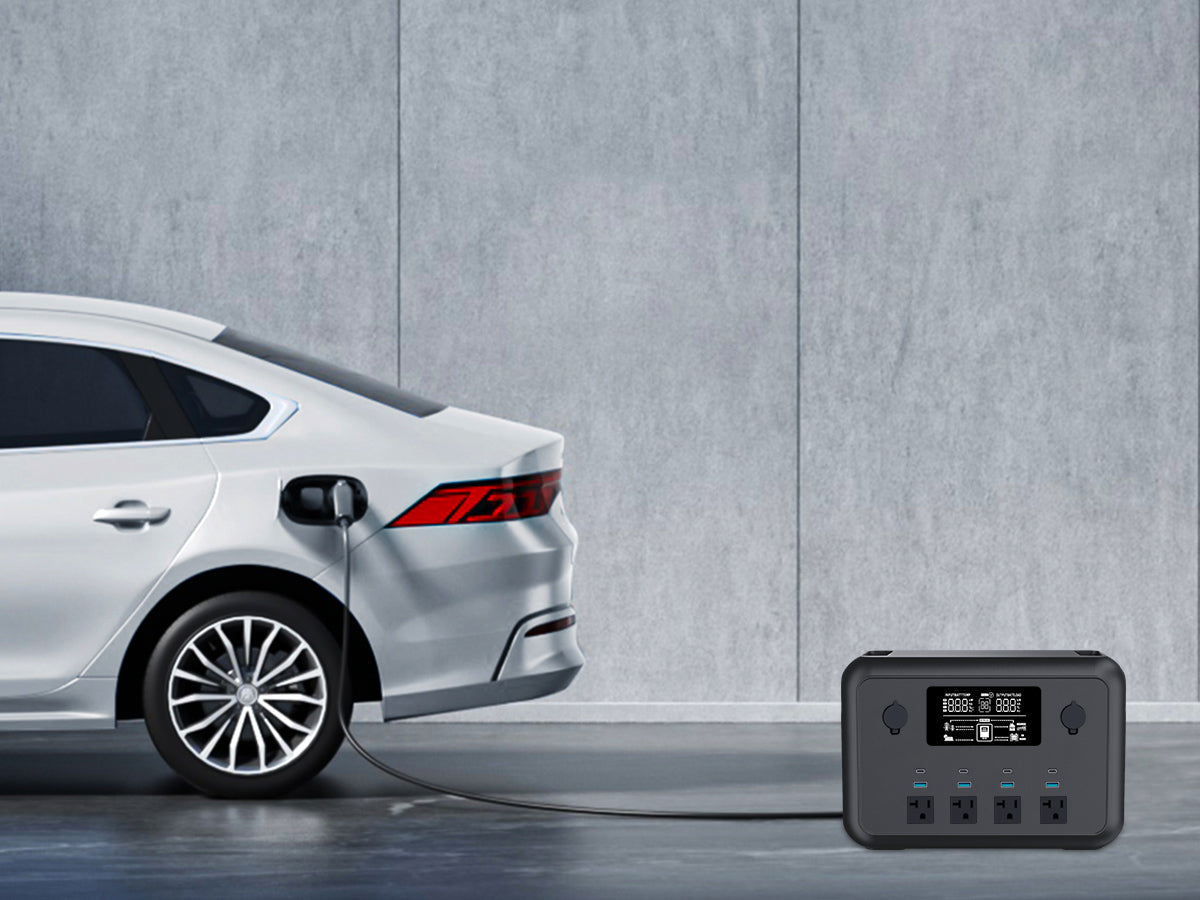Can Portable Power Stations Charge Electric Vehicles?
With electric vehicles becoming a common sight on our roads, many drivers are exploring alternatives to traditional charging methods. Portable power stations, designed for portability and versatility, are one such option. But are they practical for EV charging? Let’s explore their potential and limitations.
Understanding EV Charging Demands
EV batteries are designed to store significant amounts of energy, typically ranging from 40kWh to over 100kWh. Charging such a large battery requires either Level 2 home chargers (240V) or DC fast chargers, which can replenish most EV batteries in a few hours or less. Portable power stations, in contrast, have much lower capacity and power output, raising questions about their feasibility for EV charging. However, they can still play a role under certain conditions.
Why Portable Power Stations Are Not Ideal for EV Charging
Portable power stations are fundamentally limited in their ability to charge EVs effectively. Most models lack the capacity to store the large amounts of energy needed for a full EV charge, with typical capacities ranging from 1 to 10kWh. Additionally, they primarily support Level 1 charging (120V), which adds only 3–5 miles of range per hour—far below what most drivers would consider practical for regular use.
These technical constraints make portable power stations an impractical choice for daily EV charging. However, their portability and versatility can provide limited support in specific emergency scenarios, making them a complementary rather than primary solution for EV owners.
Practical Scenarios for Using Portable Power Stations with EVs
While not suitable for everyday EV charging, portable power stations can be invaluable in certain situations. For instance:
- Emergency Power: If your EV battery runs critically low in a remote area, a portable power station can provide just enough energy to reach the nearest charging station.
- Power Outages: During extended outages, it can act as a temporary solution to maintain minimal mobility.
These use cases demonstrate the utility of portable power stations as emergency tools rather than long-term charging solutions for EVs.
Alternative Uses of Portable Power Stations
Although they are limited in their ability to charge EVs, portable power stations excel in other applications:
- Emergency Backup: Keep essential appliances running during power outages.
- Outdoor Adventures: Power camping equipment, lights, and small appliances off-grid.
- Renewable Energy: Many portable power stations are compatible with solar panels, enabling sustainable energy use.
Choosing the Right Portable Power Station
If you’re considering investing in a portable power station, it’s crucial to select one that meets your needs. The PPS2400, for example, stands out with its exceptional features:
- High Capacity and Efficiency: Charges from 0–80% in just 60 minutes and supports expandable capacity up to 10,240Wh with additional battery packs (sold separately).
- Reliable Backup: Provides power in under 0.01 seconds during outages, ensuring uninterrupted energy supply.
- Solar Compatibility: Enables green energy charging through solar panels.
While it’s not designed for long-term EV charging, the PPS2400 is a versatile and reliable choice for emergency power and off-grid needs.
Learn more about the PPS2400 here!
Q&A Section
Can portable power stations fully charge an EV?
No, they are not designed for fully charging EVs. They are more suitable for providing a small range boost in emergencies.
How much range can a portable power station add to an EV?
Depending on the model, portable power stations can typically add a few miles of range—enough to reach a nearby charging station. For example, a station with a 2kWh capacity could add approximately 6–10 miles (about 9.6–16 km) of range to a typical EV, while larger models with 5kWh capacity might provide up to 20–30 miles (32–48 km). Keep in mind that these estimates are subject to energy conversion losses and are for reference only; the actual range may be slightly lower.
Is the PPS2400 a good option for EV owners?
The PPS2400 is excellent for emergency power and off-grid applications but is not recommended for regular EV charging.





Leave a comment
This site is protected by hCaptcha and the hCaptcha Privacy Policy and Terms of Service apply.